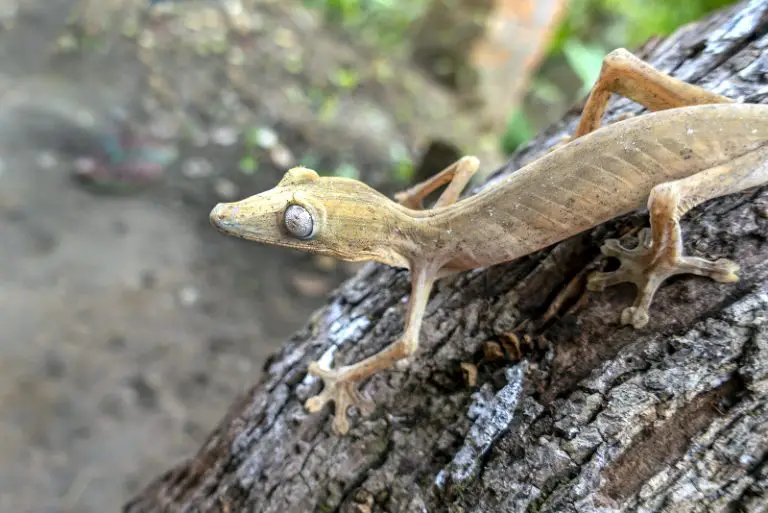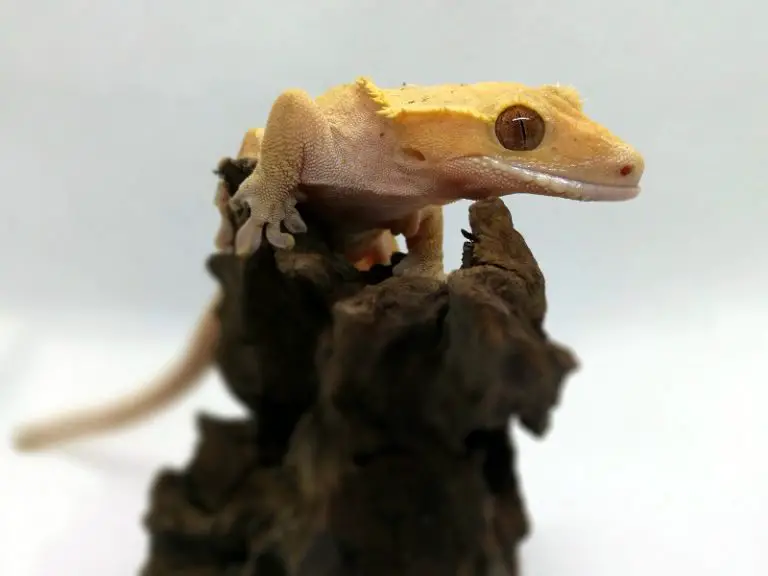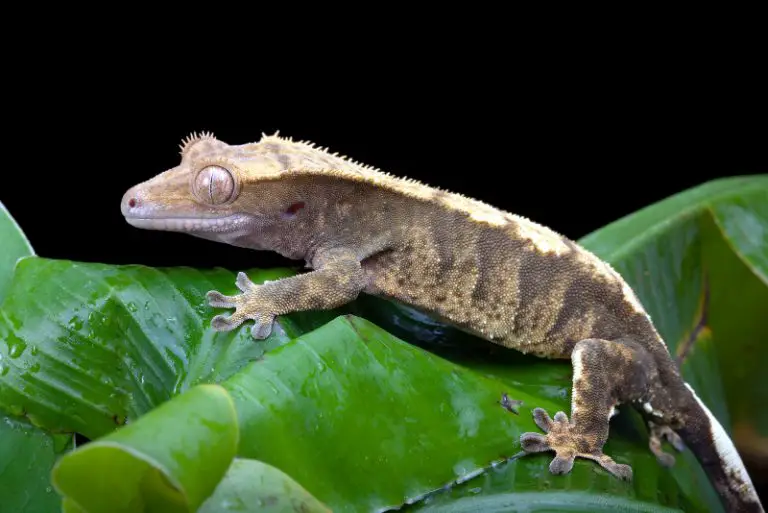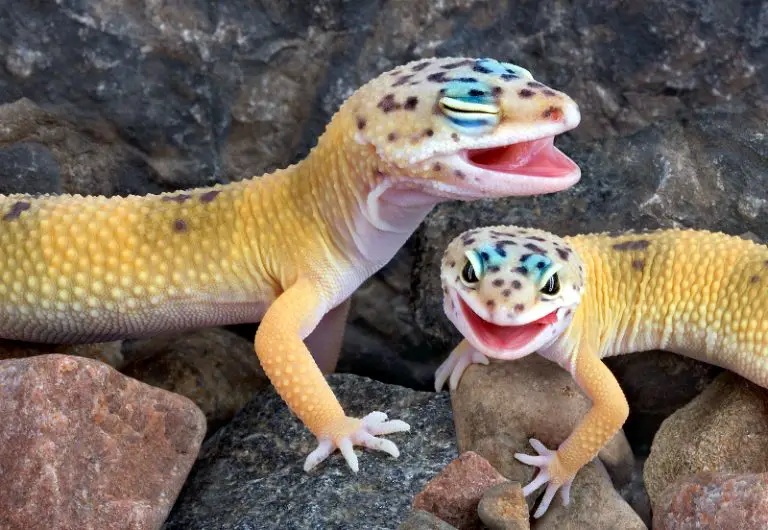How Often Do Crested Geckos Eat? [Full Guide]
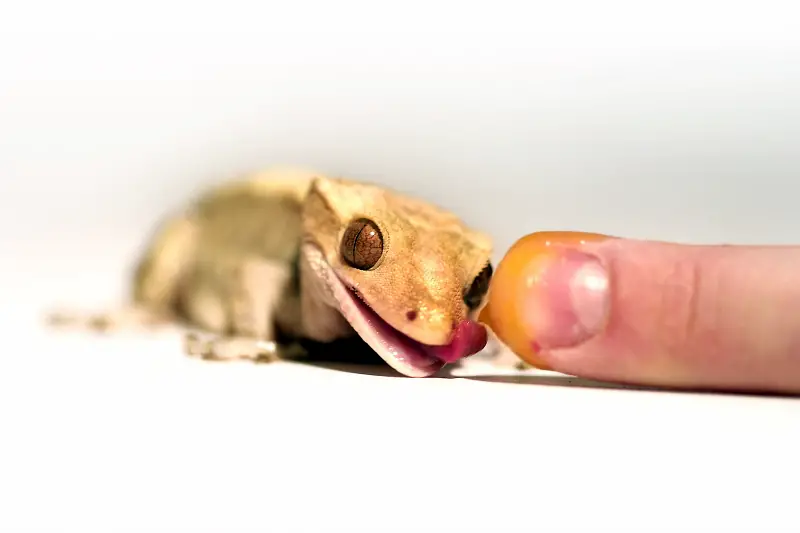
Besides housing, the most important thing you need to know about a new pet is how to feed it. Of course, you need to know what to feed it, but you also need to know how often to feed it. Unlike many animals, crested geckos don’t need to be fed every day (unless they’re babies). There are also multiple points in their lives where they’ll eat even less.

Today, we’ll go over how often crested geckos need to eat on a daily basis. We’ll also cover what might cause them to eat more or less throughout their lives.
Contents
Table of Contents
What Is A Crested Gecko?
Crested geckos make good pets because they’re friendly and docile. They’re also incredibly easy to care for, so they’re great for beginners. Most people like these geckos because of their unique colorations. There are several color variations, and each looks as interesting as the next.
They’re called “crested” geckos because of the two spines that go down their backs. They begin above their eyes and look like eyelashes.
What Can Crested Geckos Eat?
How to feed a crested gecko is fairly simple despite their complex dietary needs.
Crested geckos like to eat a combination of fruits, vegetables, and insects. Most people feed them commercially-made meal replacements. This is the best thing you can do for your gecko. Meal replacement powders are incredibly nutritious and will keep your lizard healthy.
Geckos can also eat a number of dead or live insects. Some of the most popular are dubia roaches, crickets, and worms. Insects are highly nutritious and are a great addition to your crested gecko’s diet.
Most people also like to feed their geckos fresh fruit. They like a large number of fruits like berries, apples, and melons. Avoid anything citrusy as they are toxic to crested geckos. To learn more about good and bad fruits, read our article here.
How Often Do Crested Geckos Eat?
How often you’re going to want to feed your gecko depends on their age and what season it is.
Babies
Babies should be fed every day, or at least 4-5 days a week. A complete meal replacement should be fed 2-3 times a week, while live insects and supplements should be given 2 times a week.
Breeding
Breeding geckos should be fed similarly to babies. They’ll be fed more often than other adult geckos, about 4 times a week.
Adults
Because they’re full grown, adults don’t need to be fed as often. Typically, they only need to be fed 2-3 times a week. Two of those days you should offer a meal replacement powder. Once a week, they should be offered gut-loaded insects.
Crested geckos are nocturnal and are most active at night. Because of this, it’s best to feed them in the evening. This will give them more energy for their activities.
How Often Should I Feed My Crested Gecko Insects & Worms?
Generally, worms and insects can be given one to two times a week.
The most important thing with insects and worms is not to overfeed the same kind of insect. Insects and worms have different nutritional values, so they need a variety.
How Often Should I Feed My Crested Gecko Fruit & Vegetables?
This depends on the type of fruit or vegetable. Some are healthier than others and can be fed once to twice a week. Others are less healthy and should only be given a few times a month.
How Often Do Baby Crested Geckos Eat?
As we stated above, baby crested geckos are going to eat more often than the adults. They’re growing, so they need more nutrition to stay healthy and strong. Baby geckos should be fed every day, but certainly no less than 4-5 days a week.
Watch this video: How Often Do Crested Geckos Eat
How Often Do Crested Geckos Eat During Brumation?
Brumation is the period over winter when crested geckos and other reptiles begin to slow down. Basically, this is a state similar to torpor or hibernation. You will begin to notice your crested gecko become more sluggish and inactive.
There is no definitive answer for how often they’ll eat during brumation. Their appetites change periodically throughout this time. Some days they may be hungrier than others.
Most people provide food 1-2 days during the brumation process. Don’t be alarmed if your gecko isn’t eating as much, this is normal.
You should also make sure to feed your gecko more food before it enters brumation. They will begin preparing for brumation when the days become shorter and colder.
Shortly before this, offer them a bit more food than you normally would. This will allow them to put on more weight in preparation for brumation.
Brumation usually lasts for about 3 months, and they barely eat anything during this time. Having extra nutrients built up is very helpful.
How Much Do Crested Geckos Eat?
Crested geckos are small animals, so they don’t need to be fed much. There are a few ways to go about feeding them. These tricks will help you make sure your geckos are getting enough food without overeating.
15-Minute Rule
Some people provide their geckos with a large amount of food in a dish. They’ll let their gecko eat as much as they can for 15 minutes. After 15 minutes, you’ll take the food away so they don’t overeat.
The Head Rule
Another trick is to look at your gecko’s head. Imagine how much food you could fit inside the gecko’s head if it were hollow. That is how much food you should provide. Although it’s a bit harder than the “15-minute” method, this trick is often more reliable.
Insects
When feeding live insects, you should give your crested gecko as much as he wants. Live insects are great for your gecko to exercise their hunting instincts. You do, however, want to make sure the insects aren’t too big. Large insects can be hard for your gecko to eat and can pose a choking hazard.
Insects should be a little smaller than the space in between your gecko’s eyes.
How To Feed Crested Geckos
Feeding your crested gecko is quite simple. Commercially-made meal replacements are simply mixed into a paste-like substance with water. When feeding fruits, you’ll want to mash them up so that the pieces are small. Crested gecko’s mouths are small, so they can’t handle large pieces of fruit.
If your gecko is picky and seems uninterested, just try giving them other options. Some meal replacements smell fruitier than others. Some gecko owners have reported better results than others for their picky eaters. You can do the same thing with fruits. If they don’t seem to like their fruits, try a different kind.
How Long Can Crested Geckos Go Without Food
Sometimes your gecko might become sick and won’t eat as much. A crested gecko can technically go 2-3 weeks without eating, although you never want it to get to that point. If your gecko goes more than a week without eating, something is wrong, and you should bring them to the vet.
My Crested Gecko Won’t Eat. What Should I Do?
They’re Sick
Unfortunately, reptiles usually won’t show signs that they’re sick. Usually, when you notice that your lizard is sick, it’s already too late to do anything. Still, there are things you can keep an eye on to see if your gecko is sick:
- Change in appetite
- Change in feces
- Changes in weight
- Change in behavior
- Change in coloration
- Abnormal breathing
- Discharge from the eyes, nose, or mouth
- Trouble shedding
There’s not much you can do to encourage feeding when a gecko is sick. The best thing you can do is take them to the vet, get them treated, and get them better.
There are other reasons besides sickness that may cause your gecko to stop eating. We’ll go over those here.
Your Gecko Isn’t Acclimated
Any animal that is in a new place will have a decreased appetite. This is normal and is caused by stress. As your gecko gets more used to their new home, they will be more likely to eat.
One thing you can do to entice it to eat are providing it with lots of hiding places. If it has lots of places to hide, it will feel more secure, and will be more likely to come out to eat.
Don’t try to feed with tongs. Some owners like to do this as a way to bond with their gecko. It’s a good way to feed your gecko, but you shouldn’t do it with a new addition. Shoving a pair of tongs into a new lizard’s face will only stress them out more.
Instead, give your gecko their food in a dish so that they are free to eat whenever they want.
If, after trying this, your gecko still hasn’t eaten in a week, you can offer some food on a spoon. You can gently tap your gecko on the head with the spoon to encourage eating. Regularly misting the gecko will help as well.
Your Gecko Is Stressed
The Tank
If your gecko isn’t new, there are other things that can be causing stress. The most likely cause is improper living conditions. Maybe they don’t have enough hiding spots, or the temperature and humidity is off. Or, maybe the cage itself is too small.
A tank that is too small is a likely problem for adults. But, a tank that is too big is more likely to be a problem for juveniles. Juveniles under 10 grams should only be kept in a 5 gallon terrarium. Anything larger will stress them out because they’ll have trouble finding their food.
The cage is the first place you should look. Make sure that everything inside the cage is good for your gecko. If you notice anything is off, fix it, and see if that encourages eating.
Tankmates
Stress can also be caused by other tankmates. Just like people, not all geckos will get along. Keep an eye on your geckos and see if one is stressing out the other. If they don’t get along, you’ll need to consider separating them.
As a rule of thumb, don’t put crested geckos of different sizes together. The larger gecko is almost sure to bully the smaller one. Never keep males together. They become territorial and will fight.
Also, if you want to keep multiple geckos together, you need to make sure your cage is big enough. To find out about proper tank size, read our full care guide here.
Never keep adults and juveniles together. Never mix juveniles of different ages, either. Hatchlings, babies, and juveniles should not be combined. Always keep young geckos of similar size and age together. This is especially important because juveniles are more likely to fight than adults.
Impaction
Young geckos should never be kept on loose substrate. They may try to eat it, and it will become lodged and impacted. Adults should never be kept with rocks or sand.
Large insects, or insects with hard shells can also cause impaction.
If your gecko is impacted, remove their substrate and replace with paper towels. Offer watery foods high in fiber to help them pass it. Soaking your gecko will also encourage them to pass it.
Shedding
Shedding will cause appetite loss that will occur 2-3 days before and after shedding.
Breeding
Both males and females eat less while they’re in the breeding season. Some will refuse any food that you give them. Keep in mind that females can still lay eggs even if they’re not fertilized.
Getting Them To Eat
The best thing you can do to get your gecko to eat is to find out what’s wrong. Find out what is stressing them, and fix it.
There are other things you can do to encourage eating as well:
- Offer food on a bottle cap or small dish
- Rather than placing the dish in the cage and walking away, hold it up to your gecko’s mouth
- You can discontinue this when your gecko has begun eating on their own again
- Switch up their food
- Some geckos don’t like certain foods or consistencies
- Try foods your gecko has never had before
- Switch up the consistency of the food, making it runnier or thicker
Conclusion
When they’re babies, crested geckos are going to eat almost every day. This helps them to grow big and strong. As they age, crested geckos will stop eating as much. Instead, they’ll only eat 2-3 times a week.
Other things can cause decreased appetite as well, such as brumation, shedding, breeding, and stress.
The best thing you can do is keep an eye on your crested gecko. Pay attention to why they’re not eating as much. Maybe they’re going through a natural process like brumation, or maybe they’re sick. It’s important to know the difference.
Want to learn more? Find all our guides to crested geckos here or learn whether they can eat fruit here or how big they get here. You can also find out if they need water (yes!) here. Interested in leopard geckos? Find out how often they eat here.

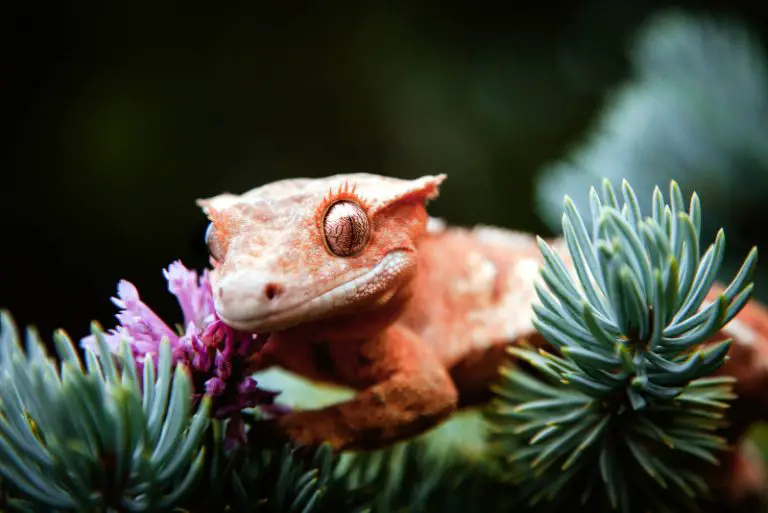
![What Fruit Can Crested Geckos Eat? [Best Fruit]](https://allourcreatures.com/wp-content/uploads/2021/12/crested-gecko-768x513.jpg)
